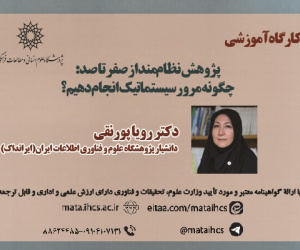ماهیت اخلاق در تعاملات رفتاری رسانه های نوین
آرشیو
چکیده
هدف: این پژوهش درصدد بررسی ماهیت اخلاق در تعاملات رفتاری رسانه های نوین بر اساس ماهیت ارتباطی آن هاست و بر نقش اخلاق در هدایت رفتار کاربران در فضای مجازی تأکید می کند.روش شناسی پژوهش : روش پژوهش این مقاله توصیفی-تحلیلی است و با استفاده از منابع اسنادی به تحلیل پدیده ها پرداخته است. همچنین رویکرد مقاله، ترکیبی از فرهنگ شناسی و رسانه شناسی است که به بررسی نقش اخلاق در تعاملات رفتاری در بستر رسانه های نوین می پردازد.یافته ها: یافته های مقاله نشان می دهد رسانه های نوین نقش مؤثری در شکل گیری و گسترش ارزش های اخلاقی دارند و با توجه به تغییر شکل تعاملات در فضای دیجیتال، مفاهیم سنتی مانند حریم خصوصی و مسئولیت پذیری نیاز به بازتعریف دارند. چالش هایی همچون انتشار اخبار جعلی، نقض حریم خصوصی و گمنامی کاربران، ضرورت توجه به اخلاق در رسانه ها را دوچندان کرده است. مقاله تأکید می کند که اخلاق رسانه ای باید با فرهنگ و باورهای دینی هر جامعه هماهنگ باشد و برای تقویت آن، آموزش سواد رسانه ای، تدوین منشورهای اخلاقی و ارتقای تفکر انتقادی ضروری است.بحث و نتیجه گیری: نتیجه گیری مقاله بیان می کند که با توجه به گسترش تعاملات در فضای دیجیتال و چالش های اخلاقی ناشی از آن، تدوین منشور اخلاقی یکپارچه بر پایه ارزش های فرهنگی و دینی ضروری است. همچنین نقش آموزش های اخلاقی و رسانه ای در توانمندسازی کاربران برای تصمیم گیری درست و مسئولانه در فضای مجازی حیاتی است. تقویت اخلاق در رسانه ها مستلزم همکاری میان نهادهای آموزشی، رسانه ای و فناوری برای ایجاد فضای دیجیتال سالم، امن و فرهنگی است.The Nature of Ethics in Behavioral Interactions within New Media Title
Objective: This study seeks to examine the nature of ethics in behavioral interactions within new media, based on their communicative nature. It emphasizes the role of ethics in guiding user behavior in cyberspace.Methodology: The research method employed in this article is descriptive-analytical, utilizing documentary sources to analyze relevant phenomena. The article adopts a combined approach, drawing from both cultural studies and media studies, to investigate the role of ethics in behavioral interactions within the context of new media.Findings: The findings indicate that new media play a significant role in shaping and expanding ethical values. Given the transformation of interactions in the digital space, traditional concepts such as privacy and responsibility require redefinition. Challenges such as the spread of fake news, violation of privacy, and user anonymity have further underscored the necessity of ethical considerations in media. The article stresses that media ethics must be aligned with the culture and religious beliefs of each society. To strengthen ethical standards, it is essential to promote media literacy, develop ethical charters, and enhance critical thinking.Discussion and Conclusion: The article concludes that, in light of the expansion of interactions in the digital space and the resulting ethical challenges, it is necessary to develop a unified ethical charter grounded in cultural and religious values. Furthermore, ethical and media education plays a vital role in empowering users to make sound and responsible decisions in cyberspace. Strengthening ethics in media requires cooperation among educational, media, and technology institutions to create a healthy, safe, and culturally rich digital environment.






